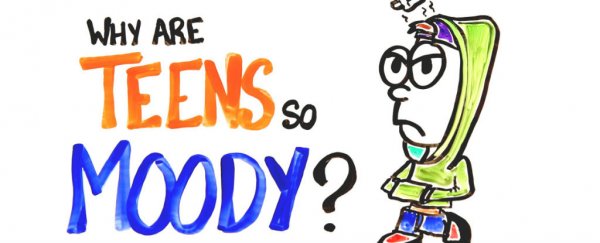You've probably heard that we undergo the most crucial period of brain development from the time we're born to around five years of age, but there's another hugely important period in our lives that influences the kind of cognitive abilities we end up with - our teenage years. Unfortunately, those formative years between the ages of 13 and 19 are not only some of the most important for our brains, they're also a complete an utter nightmare of hormones, rebelliousness, risk-taking, and crap parenting. But why all the drama?
As the latest episode of AsapSCIENCE explains, our brains don't stop growing until we hit adolescence, which means we're continuing to amass grey matter - the part responsible for things like muscle control, sensory perception, memory function, and emotion, speech, decision formation - until the age of 12 in girls and 14 in boys.
And even after that, our brains are working really hard to make themselves more efficient, by cutting away grey matter that is no longer needed, while increasing production of myelin - a fatty tissue that insulates neural pathways to ensure the speedy transmission of electrical signals between the brain and various parts of the body.
But at the same time as all of that, puberty is also happening, and suddenly, our bodies have a whole lot of chemical processes to keep under control. Puberty originates in the brain's hypothalamus, where an adorable-sounding protein called kisspeptin is released, which kickstarts the pituitary gland to ramp up production of the hormones testosterone, oestrogen, and progesterone.
As the video above explains, these hormones are crucial for the development of our ovaries and testes, but they also have another major function - they prompt us to seek more emotionally charged experiences. And that's where the rebelliousness comes into it - speeding down a dark highway in your new car might be stupid as hell, but it sure does make you feel things.
On top of this, the region of the brain that's associated with planning ahead and assessing consequences - the prefrontal cortex - hasn't fully developed in adolescence, which means the likely outcomes of doing something stupid as hell don't exactly compute.
But it's actually not as simple as teenagers simply being moody risk-takers thanks to an overload of hormones. Studies have found that when driving alone, teens and adults take just as many risks as each other - the real difference happens when there are other people in the car. Hello, peer pressure.
There's a scientific reason why teenagers tend to ditch their family members for their friends, and why out of all the age groups, teens are the best at reading facial expressions. I'll let the boys from AsapSCIENCE explain why in the video above, but let's just say that with all the stress, anxiety, horrible sleeping patterns, and heightened risk of mental illness that biology serves up in adolescence, a good friend can literally be a lifesaver.
